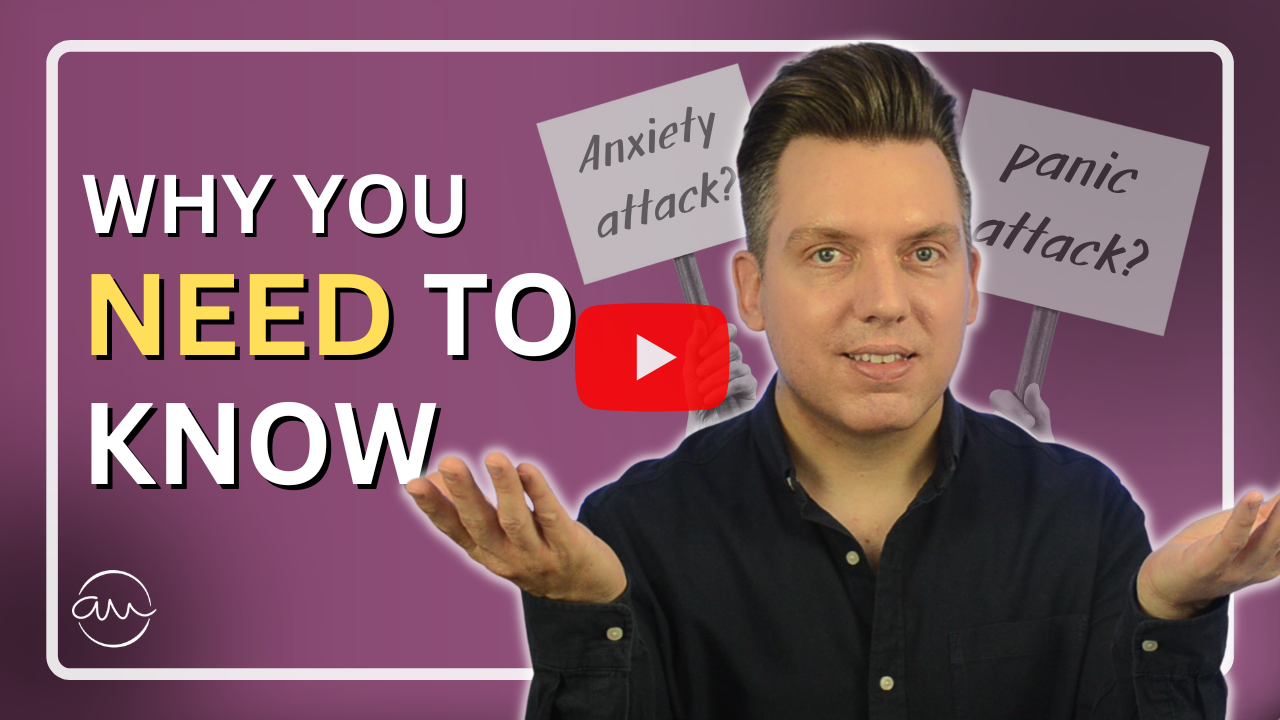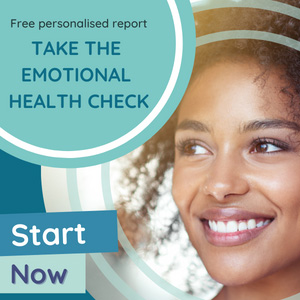Many people use the terms anxiety attacks and panic attacks interchangeably, and that's understandable, because they do have a lot of overlapping symptoms. But it's important to understand the difference because the approach to recovery for each is different. When you understand the difference, it means you can take the right steps to navigate anxiety and panic in a more practical way that allows you to resolve it more effectively.
What do anxiety attacks and panic attacks have in common?
They both involve intense feelings of fear or discomfort that can be overwhelming. Your stress response ramps up, and you might experience physical symptoms such as rapid heartbeat, chest pain, and shortness of breath, dizziness and even nausea.
It's also common to experience cognitive symptoms like racing thoughts and a sense of detachment from reality. Both anxiety attacks and panic attacks are often triggered by stress or perceived threats (real or imagined) that evoke a sense of fear or anxiety. And they might include social situations, specific phobias, traumatic events, or negative forecasting or rumination of things in the past we can't change.
What makes anxiety attacks and panic attacks different?
Anxiety can be defined as a feeling of unease, such as worry or fear, that can be mild or severe. Everyone has feelings of anxiety at some point in their life. But when those feelings don't go away, or become more severe, feelings of anxiety are more constant and can often affect the way you live and experience your life.
Anxiety attacks usually happen due to underlying anxiety and stress has been ongoing for a while. It impacts your ability to cope and think clearly. So, anxiety attacks often are often made worse in the anticipation of an event, you might have been under stress and pressure at work, being asked to do more than you feel you have the resources to deal with, maybe finances are a source of stress - but the point is; these things and the way we think and reflect on them build over time and become bigger and bigger, your internal thoughts become overwhelming and you eventually reach breaking point.
Anxiety attacks are often accompanied by increased levels of cortisol in response to worry. Cortisol is a stress hormone that is released in response to perceived threats or stressors. It plays a role in regulating the body's stress response and maintaining overall balance. And these elevated cortisol levels in anxiety attacks can contribute to symptoms such as restlessness, irritability, more worry, fear and discomfort.
Now anxiety attacks typically last for a few minutes to around 30 minutes, and your body's stress response and physiological factors, along with emotional and cognitive processes, contribute to the duration of an attack. Factors such as breath control and individual differences can also influence how long an attack lasts.
So, it's important to recognise these responses so you can regain control and start calming your nervous system down again.
The simplest way to do that in the moment is to focus on deep breathing, to regulate your breathing and activate your body's relaxation response. It helps to engage your parasympathetic nervous system and sends signals to your brain that everything is safe and under control, prompting the parasympathetic nervous system to take over and you can relax.
What is a panic attack?
A panic attack is a sudden and intense episode of overwhelming fear or discomfort that happens 'out of the blue'. It can include physical symptoms like rapid heartbeat and shortness of breath, along with cognitive symptoms such as racing thoughts and fear of losing control. Panic attacks are typically subsided within minutes.
Now whilst I say it happens out of the blue - that means it's unexpected - because there is no obvious cue or trigger when it happens, (although in my experience as a therapist, it's very common to hear how ongoing anxiety and stress contributes to panic happening too).
Panic attacks can also be 'expected' too when there is an obvious trigger, such as in a place or situation where panic has occurred or if you have a specific phobia to something like flying for example.
And interestingly when a panic attack strikes, in contrast to anxiety, it triggers the release of adrenaline and noradrenaline, which are stress hormones produced by the adrenal glands in response to fear. The sudden increase in adrenaline heightens your body's physiological responses, such as raising your heart rate, blood pressure, and respiration. This rush of adrenaline is linked to the intense physical sensations experienced during panic attacks, like a racing heart and shortness of breath.
Watch my video, What's The Difference Between Anxiety Attacks, Panic Attacks and Panic Disorder?
What is Panic Disorder
Panic disorder is usually diagnosed if you had two or more panic attacks and at least one of these attacks has been followed by one more (or more) persistent concern of having another panic attack. Panic disorder usually includes one of the following symptoms too; derealization, (feeling detached from yourself), fear of having a heart attack, or fear of hyperventilating and passing out.
Can you experience anxiety attacks and panic attacks at the same time?
Yes, you can experience anxiety and panic at the same time. For example, sometimes, anxiety about a situation can escalate and result in a panic attack. In my clinical practice, I often help clients that have had a fear of flying, so they may experience increasing anxiety as their trip to the airport and flight approaches. This heightened anxiety can lead to physical symptoms like a racing heart and shortness of breath. And this can lead to a sudden and intense surge of fear and discomfort, resulting in a panic attack.
How can you stop anxiety and panic attacks?
The good news is that both anxiety attacks and panic attacks can be treated and resolved. The foundation to overcoming both begins by following some very useful and well researched techniques that calm your nervous system. Breath work and deep breathing, muscle relaxation such as progressive muscle relaxation, physical exercise and so on - reducing your physical symptoms of panic and anxiety levels generally. Avoiding stimulants like caffeine and alcohol, slowing down and making downtime for yourself- all helps reduce stress generally in daily life which all makes a big difference in recovery.
Hypnotherapy or CBT, working with a therapist can help you reduce anxiety and panic too, a really useful way to identify and challenge negative thoughts that contribute to panic. Therapy can help you learn more relaxation techniques to cope with physical symptoms and gradually face triggers in a safe way which address underlying beliefs, so you can make positive behavioural changes and gain back control.
Techniques that help calm your nervous system and reduce the overall amount of stress and anxiety you hold internally, will in turn help you build resilience and more positive reactions and thoughts in response to your situation in life - decreasing overall anxiety and anxiety attacks and reducing the possibility of having a panic attack.
What triggers anxiety and panic?
In many ways, virtually anything can trigger anxiety, but it's worrying about your anxiety that causes a panic attack - for example when you catastrophize about a physical symptom of anxiety (regardless of the trigger), such as a strong heartbeat or palpitation - we cause more anxiety and eventually go into panic.
So, when you try hard to eliminate or avoid your panic attack, you teach your brain that your own anxiety is dangerous. As a result, your brain gets really good at quickly delivering lots of adrenaline in response to these fearful thoughts or any physical sensation associated with anxiety.
This creates a vicious cycle of your brain being increasingly on the lookout for even the smallest sign of anxiety and then responding to it with an increasingly exaggerated fight or flight response.
When we constantly worry and treat our own anxiety as a threat, we inadvertently teach our brain that feeling anxious is dangerous. To break free from this mistaken belief and the habit of worrying, we need to demonstrate to our brains that we are accepting of our anxiety. If we simply try to calm down and try to avoid panic attacks this simply makes them come back time and time again.
This means that when anxiety arises, we should be open to experiencing it instead of trying to eliminate it. It may be uncomfortable, but ultimately, it is not harmful. However, it is important to acknowledge that this is easier said than done.
The good news is you can stop panic attacks happening by following three powerful steps, and when you do, it will retrain your brain, with practice, so you don't perceive anxiety as dangerous, allowing your fight and flight response to stand down more easily, and that's the key to overcoming panic attacks altogether.
Read my blog on How to Stop Panic Attacks (before they start) here.
How Does Online Hypnotherapy work for Anxiety and Panic?
Online hypnotherapy is very effective for anxiety related conditions. In my practice, we use Solution Focused approaches, which work for anxiety and panic by combining positive talking therapy and coaching with hypnosis. During the first half of the session, we talk and avoid past problems, and instead focus on the future. You're encouraged to think and express yourself in a positive way which helps you to reduce your anxiety generally. And because hypnotherapy is a brain-based therapy, you'll also learn how the brain works in relation to your issues, but importantly what can be done to help you make changes to stop the cycle of anxiety and panic so you can regain control and feel better. This process allows you to cope better with any physical symptoms when they crop up and therefore face triggers in a safe way which addresses underlying beliefs building new positive responses and patterns of behaviour which help you recover.
Hypnosis reduces anxiety by using guided relaxation techniques to calm your body and mind. As you listen to your therapist, you will be guided into a relaxed state of focused attention by asking you to imagine certain things. Positive suggestions are made to help you make changes subconsciously by encouraging a shift in perspective. It allows your mind to reflect on the ideas and solutions discussed during our session to understand how they can help you.
How do I start online hypnotherapy for panic and anxiety?
If you'd like to explore how hypnotherapy could help you without obligation, please get in touch for a free initial chat with Andrew to explore your situation and discover what your personalised hypnotherapy program might look like.








